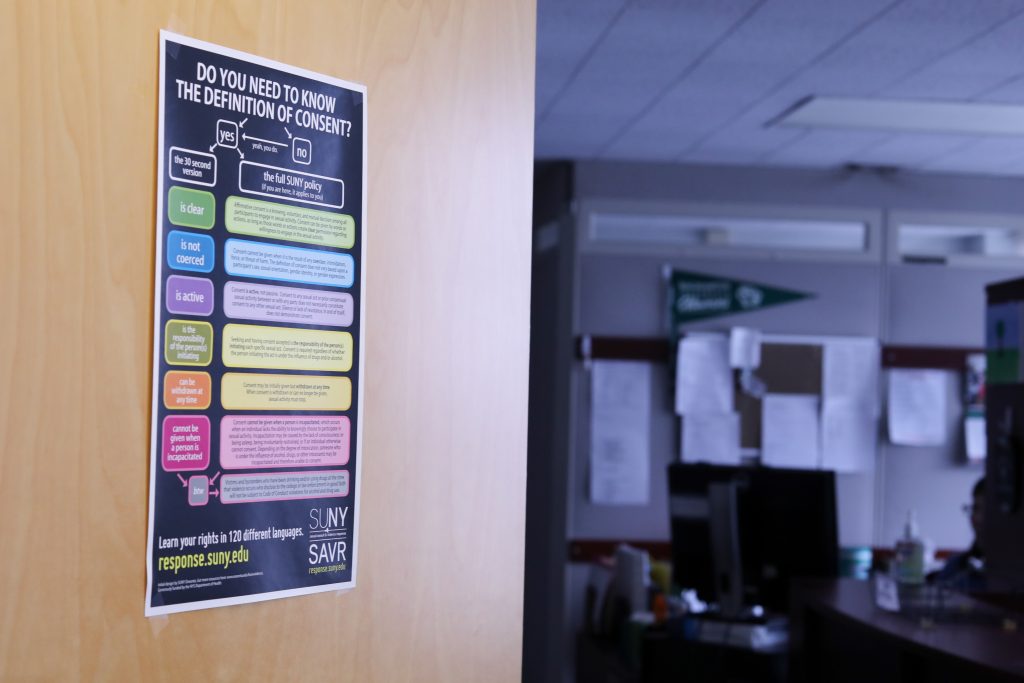SUNY Chancellor Kristina Johnson condemned the Department of Education’s proposed changes to Title IX rules in a public letter released on Tuesday.
Betsy DeVos, U.S. Secretary of Education, has been receiving backlash from thousands of universities across the nation since the release of rules in November.
Title IX of the Educational Amendments Act protects students from discrimination on the basis of sex and sets guidelines for sexual assault accusations. The Department of Education’s proposed changes would include narrowing the definition of sexual harassment and allowing for live cross-examinations in trial proceedings.
Andrew Baker, Binghamton University’s Title IX coordinator, said BU will continue to provide the same support, outreach and resources it currently does in Title IX investigations, regardless of the proposed changes. However, the changes could amend how mandated reporters, such as faculty and staff, are defined, allowing some professors and staff members who are currently obligated to report sexual harassment or assault complaints to stay silent.
“The group of individuals required to report information to the Title IX coordinator may become smaller if the proposed regulations remain unchanged,” Baker wrote in an email.
Even if the proposed changes are enacted, most faculty and staff would still be required to report information under another federal law, the Clery Act, which requires universities receiving federal funding to disclose crime statistics, including sexual assault and harassment, provided those crimes are disclosed to campus police or categories of faculty and staff designated as campus security authorities. Baker also noted that New York state has other laws in place to protect students during Title IX investigations.
“NYS Education Law 129-B, which concerns sexual assault, stalking, dating violence, and domestic violence, and has substantial overlap with current Title IX regulations, will continue to remain in effect and require much of what we do now to remain unchanged,” Baker wrote.
The changes could also impact the Office of Student Conduct, which may be required to alter what information it communicates to both parties once an allegation of sexual assault or harassment is raised. Another relevant change would give both parties increased opportunity to access evidence collected during the investigation, which could add to the length of the process.
Breanna Langett, a senior double-majoring in history and classical and Near Eastern studies, said she thinks Title IX should still be aligned with laws like 129-B to maximize protections for students.
“It’s important to be protected under all laws so there is a common ground for all universities and colleges,” Langett said. “One college should not have lesser protections than another as it is not fair to the student.”
Along with the inconsistencies in state and federal law, Johnson’s letter states there is no evidence the proposed regulations are aimed at reducing discrimination on the basis of sex.
In a statement released in November, Johnson said she took pride in New York’s “Enough is Enough” legislation, which combats sexual assault on public and private university campuses. She also named two free web-based tools for victims and survivors of sexual assault or interpersonal violence, including the Sexual Assault and Violence Response and a Sexual and Interpersonal Violence Prevention and Response Course.
“It is from this foundation that we will present our expertise during the public comment period for the Department of Education’s proposed regulations for Title IX and look forward to submitting comments that are reflective of the views of our campuses, students and their families,” Johnson said.
Margaret Shea, a junior majoring in sociology, said she thinks the proposed Title IX changes should be made more apparent to students.
“I was not informed about the Title IX changes to the Educational Amendments Act,” Shea said. “I do believe students have the right to know about the changes in their educational experience, whether the impact is noticeable or not.”



